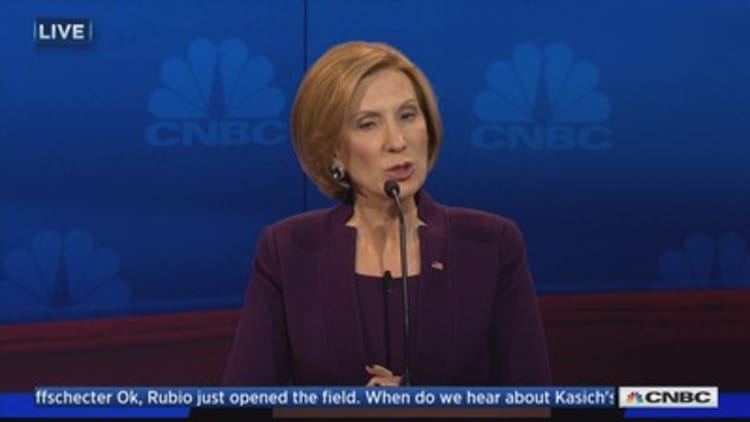
Since the Great Recession, the eroding middle class has been a key talking point. And during the third Republican presidential debate, hosted Wednesday by CNBC, candidates Carly Fiorina and Ted Cruz, in particular, called out stalled wages and the expanding gap between the nation's highest and lowest earners.
Data in fact shows low-wage U.S. occupations seeing the largest real wage declines since the recession — with lower-earners' pay falling more quickly than workers in higher-paid jobs, according to analysis from the National Employment Law Project (NELP). Inflation-adjusted or "real" wages reflect workers' purchasing power. As pay declines, so does the amount of goods and services workers can buy with those wages.
"Taking into account cost-of-living increases since the recession officially ended in 2009, wages have actually declined for most U.S. workers," according to data released last month from NELP.
"These are very serious times," said Fiorina on Wednesday during the debate, held in Boulder, Colorado. "Meantime, wages have stagnated for 40 years. We have more Americans out of work, or just Americans who have quit looking for work."
Read MoreCandidates' claims: The Fact Patrol reports for duty
Of course, the failure of wages to keep pace with the rising cost of living is not a new trend. The declines in real wages since the downturn continue a decades-long shift of wage stagnation for pockets of American workers.
Low-wage occupations hit the hardest
Averaged across all occupations, real median hourly wages have declined 4 percent from 2009 to 2014, according to NELP data.
Two occupations that have suffered the biggest wage drops from 2009 to 2014 were in the restaurant sector: Cooks and food preparation workers, who experienced wage drops of 8.9 percent and 7.7 percent, respectively.
Personal care and home health aides also experienced wage drops of 6.6 percent and 6.2 percent respectively for the same period.
Wage declines were also pronounced for retail sales associates, janitors, cleaners, waiters and waitresses.
Later in the debate, Cruz chimed in on low wages particular effect on women. "Under [President] Barack Obama and the big government economy, the median wage for women has dropped $733," he said.
But according to FactCheck.org, the most recent breakdown from the Bureau of Labor Statistics of median usual weekly earnings of full-time wage and salary workers shows that for women the figure was $728 in the three months ending Sept. 30— up from $647 in the last three months of 2008. That's a gain of $81 per week.
Cruz may have gotten his $733 figure that relied on figures for 2013, according to FactCheck.org, while newer figures were released last month.
The minimum-wage fight
Looking ahead to the 2016 election, the debate surrounding the $7.25 minimum hourly rate will only intensify. Most Republican candidates have said they don't think now is the time to raise the federal minimum pay, citing lost jobs.
Read MoreRepublicans weigh in on $7.25 minimum wage
"The Democrats' answer to everything is more government control over wages and more empowering trial lawyers to file lawsuits," said Cruz on Wednesday night. "We've got to turn the economy around for people who are struggling."
Higher-wage advocates disagree. "Almost 30 cities and counties have moved in recent years to increase their minimum wage, and a growing list of cities and states are moving towards a $15 minimum wage," said Laura Huizar, staff attorney for NELP's Action Fund, a research and advocacy group for low-wage earners.
She added, "This movement for a $15 minimum wage reflects frustration across the country, with declining wages and the federal government's failure to respond to the wage crisis."
Read More How unions, cities are flexing their power in the wage fight


